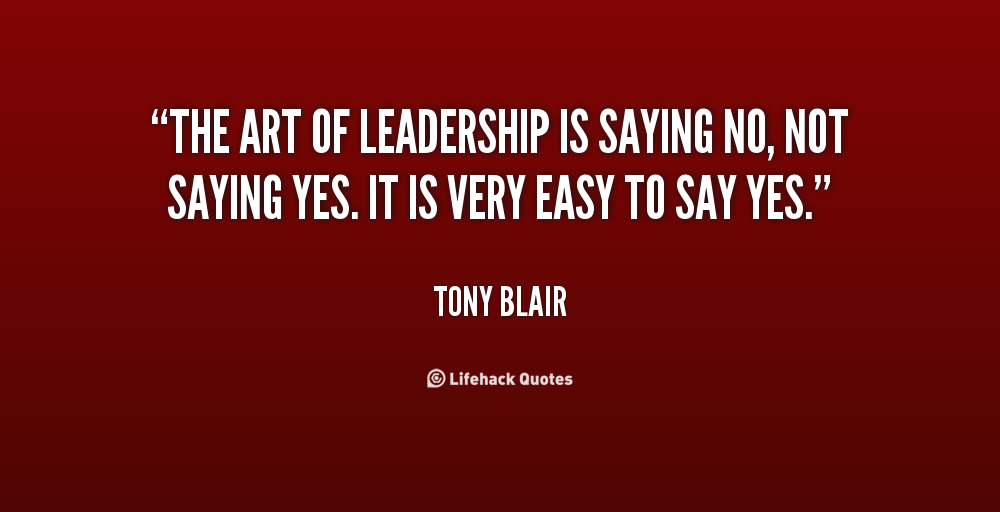Bob Dylan gave no convincingreason. He hadn’t even responded to calls for a fortnight. So whenhe finally gave the Nobel Committee a firm ‘no’ to the question ofwhether he would be collecting one of the world’s most prestigiousprizes, it caused something of an angry debate.

On the one side,there were those who considered him the ungrateful adolescent; onthe other, those who saw him as the rebel, going his own way,sticking it to the Man.Saying no isn’t easy. We thriveon community cohesion. Having experienced it ourselves, we feelempathy with those to whom it is said; being said no to has beenproven to cause genuine psychological damage. Small wonder thenthat saying no typically happens only privately, quietly, couchedin obfuscation of the fact of the matter.
The French get it. They refer to ‘je refuse’ -what strikes them as the right not to do something.
It’s a rightthe French president Francois Hollande invoked in 2014 when askedpoint blank in an interview if he had had an affair, a questionthat would have been answered with prevarication by a politician ofany other nation.Perhaps this is because sayingno is, ultimately, an expression of freedom, but also of power.“The difference between successful people and really successfulpeople is that really successful people say no to almosteverything,” as Warren Buffett, one of the world’s richest men, hasit. “The art of leadership is saying no,” as Tony Blair, previousBritish prime minister and three time general election winner, hadit. But this is not tosay there is no cost to what can, on the surface, look to be merelylinguistic rebellion. Some have seen putting their careers on theline as the acceptable price of outspokenness. May be the best known of actors to havesaid no thanks to his Oscar win - In 1973 he sent a Native Indianrepresentative in his stead and, to a chorus of boos from theaudience, issued a statement about the misrepresentation of theUnited States’ indigenous peoples in the movies. Yet he was not thefirst.Two years prior, George C. Scottshunned the Hollywood establishment - which has made countlessmillions out of stories of the lone -not once but twice, first by rejecting his ‘Best Actor’ nominationfor Patton, then by turning down the award when he won itanyway.
The Oscars ceremony was, he said, in no uncertain terms, “atwo hour meat parade, a public display with contrived suspense foreconomic reasons. The crying actor clutching the statue to hisbosom - it’s all such a bloody bore.”.
The Art Of Saying No Book Summary
OVERVIEW:No is perhaps the most important and certainly the most powerful word in the language. Every day we find ourselves in situations where we need to say No — to people at work, at home, and in our communities — because No is the word we must use to protect ourselves and to stand up for everything and everyone that matters to us.But as we all know, the wrong No can also destroy what we most value by angering and alienating people.
That’s why saying No the right way is crucial. The secret to saying No without destroying relationships lies in the art of the Positive No, a proven technique that anyone can learn.This book gives you a simple three-step method for saying a Positive No. It will show you how to assert and defend your key interests; how to make your No firm and strong; how to resist the other side’s aggression and manipulation; and how to do all this while still getting to Yes.
In the end, the Positive No will help you get not just to any Yes but to the rightYes, the one that truly serves your interests.Based on William Ury’s celebrated Program on Negotiation executive seminar, The Power of a Positive No offers concrete advice and practical examples for saying No in virtually any situation. Whether you need to say No to your customer or your coworker, your employee or your CEO, your child or your spouse, you will find in this book the secret to saying No clearly, respectfully, and effectively.In today’s world of high stress and limitless choices, the pressure to give in and say Yes grows greater every day, producing overload and overwork, expanding e-mail and eroding ethics.

Never has No been more needed. A Positive No has the power to profoundly transform our lives by enabling us to say Yes to what counts — our own needs, values, and priorities.